1133 - 1352: The EnlightenmentQueen Mary took up the mantle of Defender of the Faith and set about her role seriously; between the 1130s and 1140s, Mary oversaw the conversion of India to Confucianism, investing heavily in missionaries to spread the word of Confucius, but efforts to do the same in Ethiopia were stymied by their strict Theocratic government. During the same period, the Ethiopians began a concerted effort to see the world beyond their shores; the vast but limited Ethiopian fleet saw major upgrades, with their entire attack force being rebuilt from trireme hulls to caravels.
Mary's reign saw an increased focus on religious unity and military preparation, but she is largely noted for her marriage to Prince David of Wales, which paved the way for the series of personal unions between the Crowns of England and Wales, which would follow on to her daughters, then their children until eventually both being held by a single monarch.
Mary also sponsored the writing and perfomance of the Punic Cycle
, an epic series of plays focusing on the heroism of the Punic Wars. Middleton, the playwright, was a staunch believer in the manifest destiny of England, and set many of his plays (anachronistically) in his hometown of Camelot, formerly known as Cantiacum.
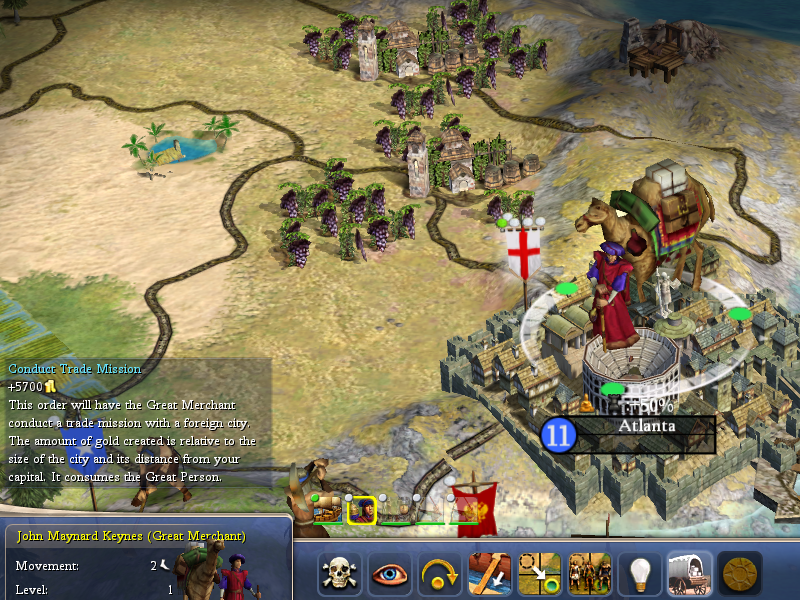
Mary also sponsored the expedition of John Maynard Keynes, a merchant adventurer and the first Briton or African to trade with the Americas. He made port in Atlanta in the late 12th century and established a trade mission that would occupy him for the rest of his life and bring back a fortune in exotic trade goods such as wine, furs, incense, silver and especially silk, setting up the Silk Lane between Africa and America that would dominate maritime trade in the following century. The English crown took its fair share of tax from the mission as well.
Keynes' mission was almost ruinously expensive to fund, and neither Keynes himself nor government investment could have covered the cost. By making use of the developing field of banking, Keynes sold shares of his enterprise's profits to private citizens in exchange for investment in his endeavour. His success encouraged others to seek investment from the wealthy middle class and this became such an entrenched practice that the Royal Exchange was set up in London, the first true stock exchange for brokers to buy and sell shares on behalf of businesses and investors.
[You recall how I mentioned gold-to-beaker ratios? We're actually running a 0.95:1 gold:beaker ratio, which is actually pretty awful; I have been enhancing the gold-producing buildings, true, but this is mostly a reflection of the poor Zulu provinces that need development. If it was better, I would splurge all of that gold into research, but seeing as it's not? We are in the process of significantly expanding our spy network. We need about 12 more spies, which will cost us 2400g in rush builds. The trade mission puts us up to six grand in gold. If I set the slider to 100% research, it puts us at a deficit of -356g/turn. I can keep this up for about ten turns, even with rush building the spies we need, which will get us Astronomy ten turns ahead of schedule and nearly thirty turns ahead of Zara. Astronomy opens up trade with the New World, so it's pretty worthwhile.]
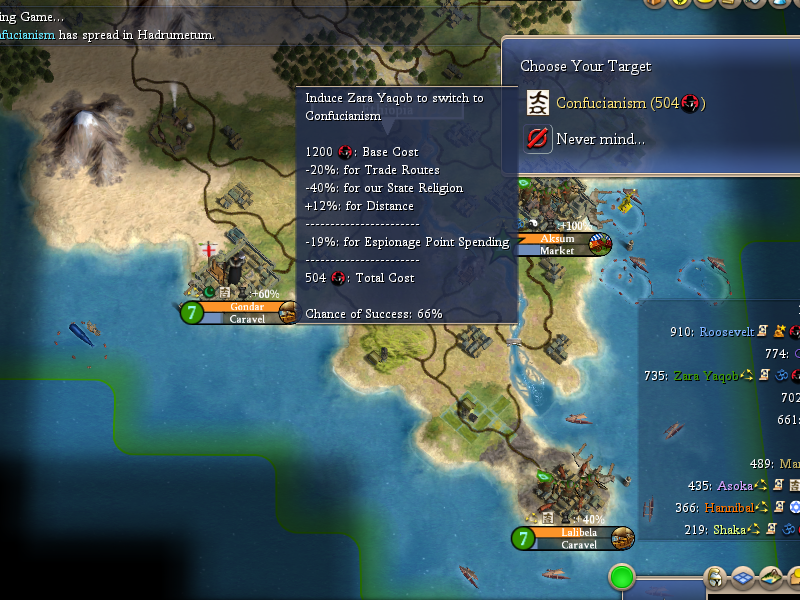
The late 12th century, especially under the influence of Queen Eleanor of Wales, saw a marked increase in the power of the advisors known as Lady or Lord Ordo. It also saw Eleanor pursue the same quest her grandmother had, but by less virtuous means. The Divine Assembly of 1182 was a religious movement originating in the Confucian province of Gondar in southern Ethiopia, which the records of Lord Ordo at the time indicate were heavily backed by the combined Welsh-English treasury. An armed insurrection with populist support in the south of Ethiopia (and nowhere else), the Assembly took control of the captial of Aksum and converted the Prince of Ethiopia at sword-point. The Divine Assembly renounced the authority of the Papacy and instead took over the machinery of the Papal theocracy within Ethiopia, converting it for their own ends. Where once all faiths but Hinduism were proscribed in Ethiopia, now only the worship of Victoria according to the writings of Confucius could be permitted. The Assembly then, using Welsh-trained mandarins, began the process of forcibly converting the midlands of Ethiopia.
For all the prowess of the Lady Ordo, however, it is little surprise that the Ethiopians had their own counterpart; Balthasar Gerard, a man of keen intellect and mixed background, it is now known to us that Gerard succeeded in breaking all of the English codes then running, as well as possessing a through understanding of both intelligence networks and how best to infiltrate and defend them.
[Oh my goodness I love espionage. Zara certainly didn't have enough population following Confucianism to make a voluntary conversion, but espionage can force one so long as there are even some worshippers. Zara was and is running Theocracy, so my earlier efforts to convert his cities were for naught; in Theocracy you can only spread the state religion. I considered shifting the civic to give him trouble, then realised that the civic was just fine, it was only the religion that needed fixing. Now if he wants to convert back, he can suffer the anarchy. Also, it looks like Zara got a Great Spy - uh-oh. Unrelated fun fact: 10% of the world is Hindu, 16% is Confucian, 42% is Buddhist. Sumer is primarily Jewish, Mali primarily Christian.]
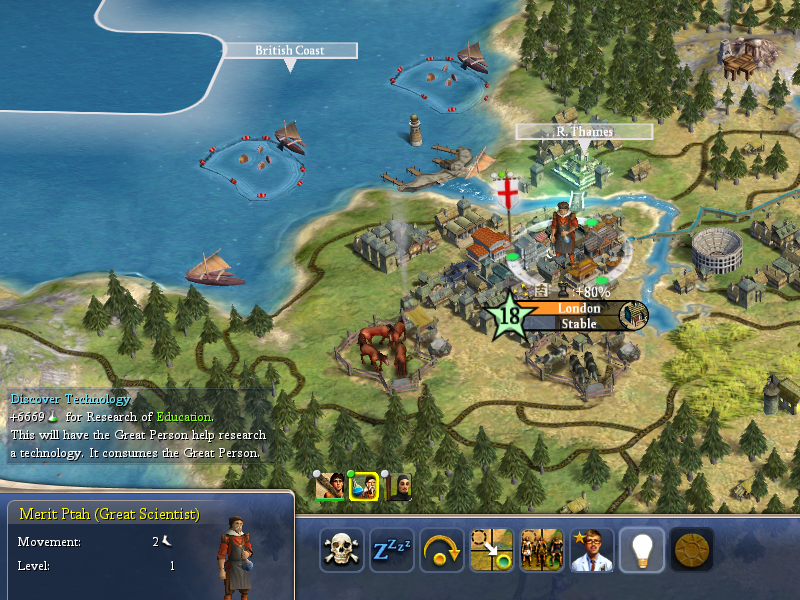
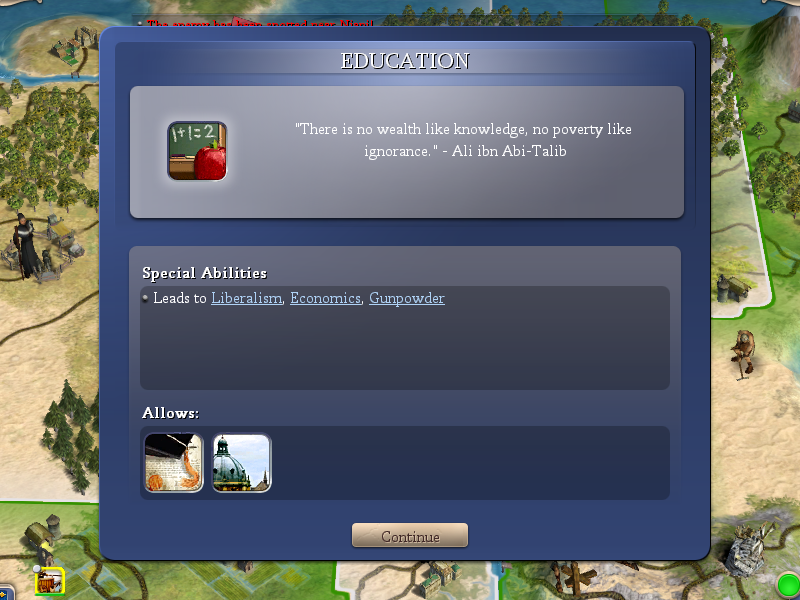
At the turn of the thirteenth century, the scholar Merit Ptah came to prominence in the Academy at London, now expanded not only by Sankore's colleges but by a devoted wing for worship, prayer and contemplation that would be a model for religious Academies thereafter. Ptah made the rounds of each and every college in the Academy, including his own scholarly work at the Academy Library. An incredibly learned man, Ptah considered the one-tutor college system of the Academy to be woefully inadequate for the purposes of teaching students. Ptah established his own college, not merely with himself to teach but hiring other scholars from his own wealth and those fees of the students' to lecture, each one only in the subjects of his specialty and in so doing Ptah sought and achieved a complete curriculum. Whilst initially mocked and derided by other scholars of the Academy, within eight years Ptah's college had become the most sought-after education in the realm. Ptah also inisted that any student, regardless of background or belief, even non-Confucians, could study at his college so long as they could afford the fees or were granted an appropriate scholarship. "Open to all", was Ptah's motto, and so it was that his college and the Academy became known as the University.
With the foundation of the first true University and the spur to rational thought and discovery after five hundred years of relative ignorance, we enter the British Renaissance.
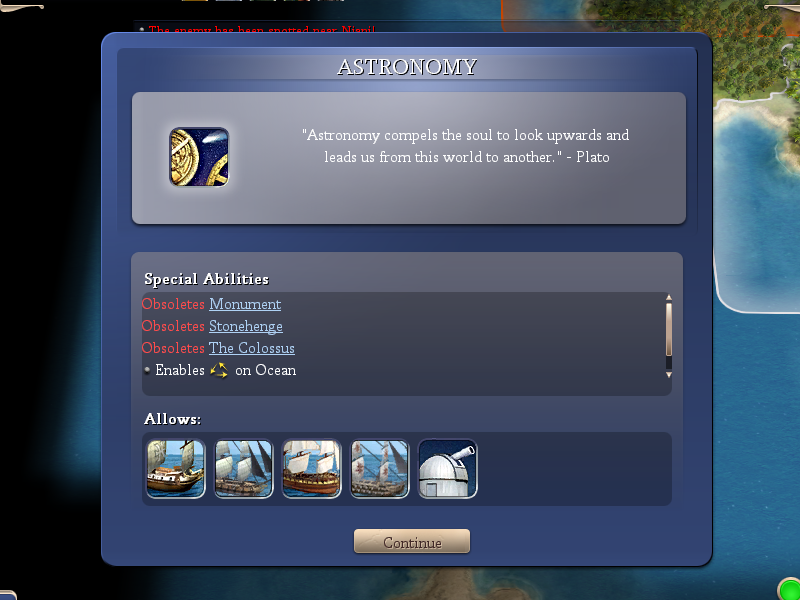
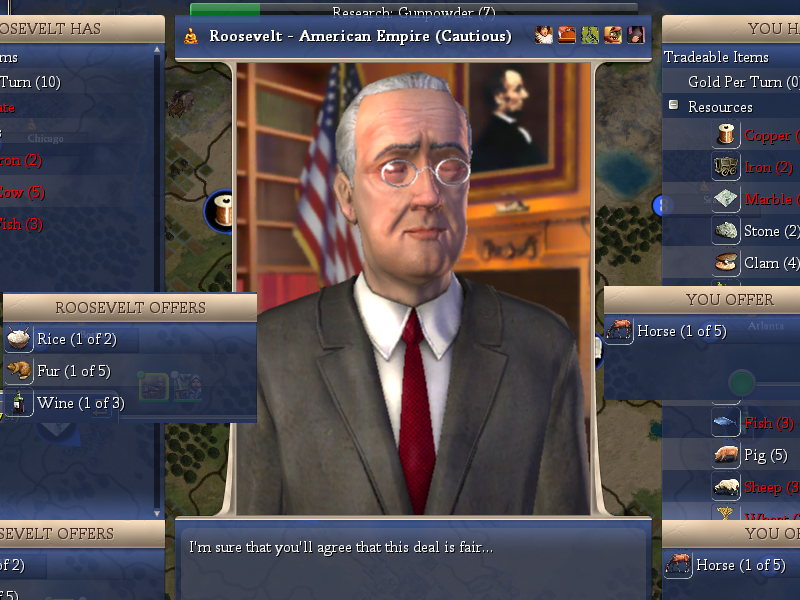
In 1232, scholars at the University invented the astrolabe as a means of divining one's position at sea, coupling this with carefully obtained star charts from different positions around the world, results of the budding field of astronomy. Whilst stargazers had existed since time immemorial, the scholars of the University represented a true effort to categorise the night sky and attempt to figure out exactly what the points of light were - resulting in the discovery of several 'wandering stars' that were actually planets.
In a practical sense, however, the invention of the astrolabe freed ships from the tyranny of staying on land, permitting even larger ships capable of carrying cargo and passengers to make the journey. Many of the first ships followed the Silk Lane that Keynes had established, widening the avenues of trade with America and bringing a wealth of goods to and from the distant continents. Trade with Eastern America was particularly fruitful; rice, wine and luxurious furs were traded to the English and thoroughbred warhorses were shipped back. Horses were not native to southern America, and neither Eastern nor Western Americans had possessed cavalry. Naturally the very same horses were traded to the Western Americans for silk and dyes. Russia rounded off the marketplace with the sale of the hitherto unknown fruit, the banana.
The ease of navigation resulted in a doubling of the English Royal Fleet, as well as the rebuilding of several older ships into the modern galleon style. This in turn prompted the construction of two notable canals; the Camelot Canal by the city of the same name, saving ships the round trip around the West Anglian Cape, and the St Albans Canal in northern Scotland, serving a similar purpose. Freer travel also saw the migration of many of the working class (a majority of which were descended from the Iceni that had been oppressed for thousands of years, which is why Isen is such a common name today) north to Zululand, where jobs had become available working the fertile Zulu plains.STATUS: PEACE, FREEDOM OF PASSAGE, ALLIED FAITH
THREAT: SIGNIFICANT - Ethiopia, alongside Sumer, represents one of the immediate threats to Anglo-Welsh dominance over the Eastern Hemisphere. Whilst lagging behind in certain naval aspects, Ethiopia is catching up and will likely boast similar vessels within the century, if they do not steal plans from us first.
WEAKNESSES: Limited to the eastern British Isle. Until they have caught up with our advances in navigation, Ethiopia cannot settle other lands reliably.
Relating to above: Limited Power Projection. Despite a potent army and navy, the expansive British coastline prevents easy deployment of troops to anywhere other than the British realms.
Technological Inferiority: A temporary advantage, quickly being nullified. If our descendants cannot seize the advantage within the next two centuries, we are lost.
STRENGTHS: Economy - Ethiopia possesses a powerful trade-based economy, rooted in its extensive and expansive sub-urban industries.
Sea Trade: All but one Ethiopian province is coastal, permitting a significant boon in terms of available trade sources.
Naval Supremacy: Ethiopia has a fleet double the size of the combined Royal Navy, including capable guardians in the form of caravels.
Armed Forces: Ethiopia is significantly more mobilised than Anglo-Wales. Current force estimate is thirty regiments, nearly half of which are based in the capital.
Resources: Ethiopia maintains two iron mines and two provinces ideal for horse breeding, one of which a city has been built around. Ethiopia can produce cavalry and weaponry at will.
The Church: Whilst the Pope has been hopefully neutered for now, the machinery of the church is still in place under Confucian guidance. The prevalence of holy orders means that we can expect Ethiopian armies to be well-trained and zealous.
Espionage: The Ethiopian intelligence service is robust, thanks to the lasting influence of Balthasar Gerard and high spending on intelligence. Gerard's school for spies is located in the capital. We currently counter this successfully, but government is compromised to the middle levels and our own intelligence service is compromised in the lower levels.
Aristocracy: An entrenched system of nobility helps keep the populace in check. Whilst the provincial towns can avoid dissent with the use of religion and luxuries to bribe the influential, the capital's large and cosmopolitan population can only be sustained with the aid of the barons.
Bureaucracy: A well-established civil service governs the realm, made up of the minor nobility, not unlike our own. The focus is thus on the court and the capital, permitting great concentration of wealth and labour.
CURRENT MILITARY DEPLOYMENT BY REGIMENT:
Addis Ababa 2 Longbow, 1 Sword
Debre Berhan 1 Longbow, 1 Sword
Adulis* 1 Longbow, 1 Pike, 1 Axe
Qohaito 2 Longbow
Yeha 2 Longbow, 1 Mace
Gondar* 1 Longbow, 1 Sword
Lalibela 2 Longbow
Aksum* 1 Cross, 3 Long, 3 Pike, 2 Sword, 1 Axe, 3 Chariot
* Indicates walls. Aksum has a fully-built castle. All towns have entrenched militia setups.
CURRENT NAVAL DEPLOYMENT:
Aksum 6 Caravels, 4 Galleys
Addis Ababa 1 Galley
Adulis 1 Galley
Note: Two additional caravels are in production.
STRATEGIC RECOMMENDATIONS
LONG TERM: We cannot afford an immediate war with Ethiopia. Their military and naval presence outranks our own, and whilst we could win such a war it would be a protracted matter of attrition, involving combat on home soil. We should be able to rebuff any attacks they make, but a war of conquest is impractical. We must expand our navy and army, as per the plans laid out in the attached document. Please note that this is no light endeavour; I estimate readiness within a century, so this plan should be retained and updated by my successors until readiness is achieved. Nevertheless, the attached plan would ensure a quick victory with minimal losses and time spent, with a war taking no more than three years.
The weaknesses of Ethiopia are not difficult, but not useful to exploit. Let us consider their strengths. When we are ready to commence war, we must blockade their ports, denying their trade and cutting off a portion of their wealth; perhaps only a fifth, but this will slow their ability to prepare. We should avoid sabotage of the townships of Ethiopia; there is no sense in poisoning a well we seek to capture. Indeed, the reasoning behind my delayed, fast strike on Ethiopian territories is to prevent scorched earth tactics being employed by the enemy, denying us what we seek to claim. A result of their organisation is that the majority of Ethiopian economic, political and military power is based in the capital. By making it the first target of warfare, we can break their strength before mopping up the rest of their territory.
As above, the greatest strength of Ethiopia is its capital, Aksum. Aksum produces 86 silver pounds' worth of taxes every five years, most of which is spent efficiently on research and academia and a small amount spent very efficiently on their intelligence network. Aksum can reliably put twenty six tons of iron or similar materials towards completion of a local project within five years, thanks to its capable bureaucracy. Aksum has 2.8 million residents, encompassing nobility; middle classes; slaves, who make up some 20% of the population; and an underclass of free but impoverished workers who make up a further 50% of the residents. The city is divided up into districts, ruled by noble houses with their own private guard/armies who enforce peace within the city in exchange for wealth, luxury, privileges and political status. If not exactly happy, Aksum is very stable and content with a great deal of local pride and solidarity.
Being its greatest asset, Aksum is Ethiopia's Mandubracian Heel. Without the well-established nobility keeping it in check, by all rights Aksum should be a violent mess of different cultures and rivalries at war.
Unfortunately, we cannot yet initiate a revolution until they can comprehend the same system of government that we employ; one of actual representation.
- A Military Report on Ethiopia, 1238, Released Ordovici Archives
[Damn it. I was hoping to flip their civic away from hereditary rule, but it turns out that a) it needs to be the same civic I'm using and b) they need to know the tech to make the flip possible. In other words, I can't flip them until I know democracy; which isn't likely to happen soon. We'll have to do it one of the old fashioned ways.]
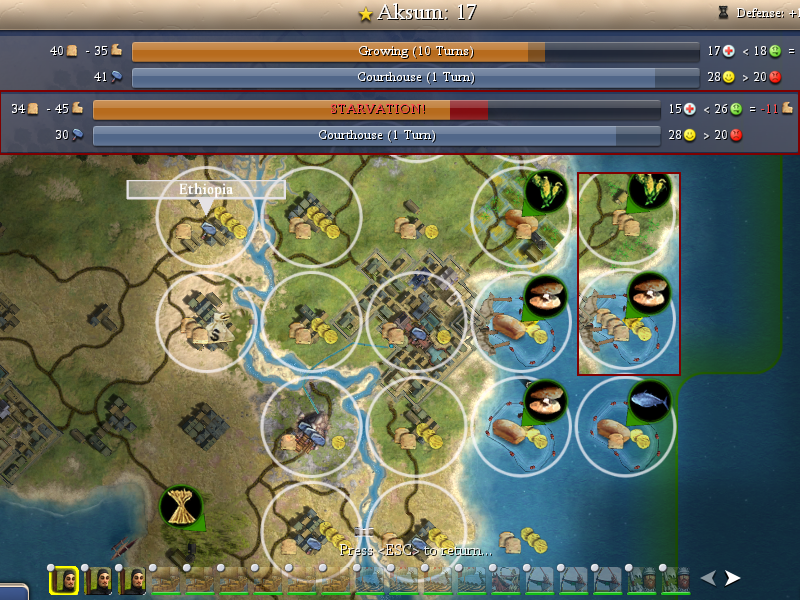
On the 5th of November 1271 a series of disasters rocked Aksum, beginning with a brilliant plume of flame from the coast, first thought by many to be the light of the lighthouse flame atop the Colossus of Aksum's torch. This was not a poor surmise, as it was the very lighthouse portion of the Colossus that was destroyed by saboteurs in the ensuing explosion. Within the same night, flames ravaged the nearby countryside, burning down countless acres of wheat needed to feed the metropolis. Worse still, salt was sown in the fields and the great aqueduct watering both field and city was poisoned with arsenic at the source. In a final display, further flames rocked the mines that fed the city's forges. Overnight both the industrial capacity and the basic food supply of Aksum had been devastated. Grain was no longer readily available, and the destruction of the lighthouse portion of the Colossus increased the danger for the fishing boats in the harbour, causing many avoidable crashes and reducing the willingness of fishermen to brave the seas. Finally, the arsenic poisoned many of the stores already laid in. Tens of thousands began to starve.
Up until this point, the influence of England and Wales had been a subtle hand upon the tiller of Ethiopian politics. With the conflagrations of the 5th of November the antagonism between the two nations became plain to see, the impact of which echoes down the centuries to us even today in the form of Bonfire Night. It was also an early example of weaponised gunpowder, which would see its heyday in the coming century.
[I knew there was something I could do. We lost agents Feynman and Jenkins, I believe, but their replacements are already in production. The benefit of having twelve offensive spies on payroll. As a side note, we also sabotaged production of a caravel when it was one turn from completion, which was quite satisfying. If nothing else, this should force them to rededicate some of their specialists to farm work. If we're very lucky, it should divert resources from research.]
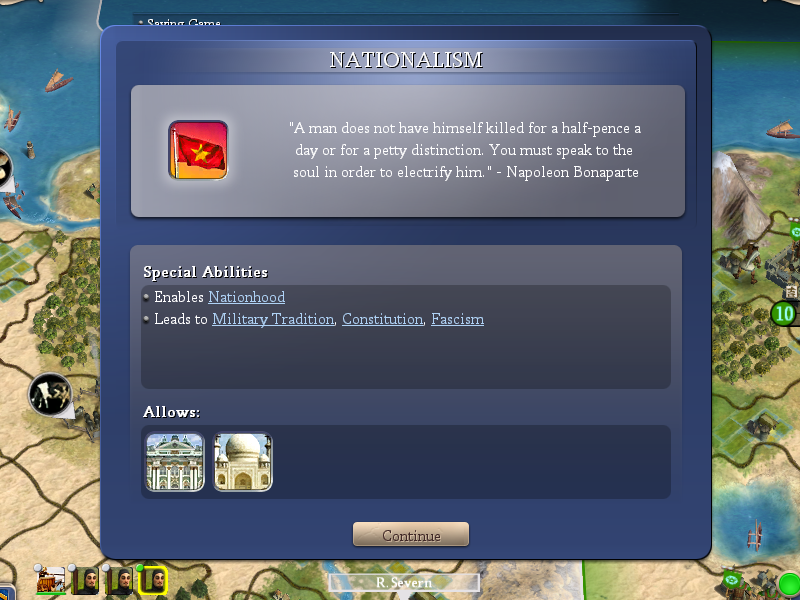
In 1286, Prince William, of the Welsh branch of the Pendragons, sired a daughter with Queen Anne of Scotland, who had no other claimants to her title. Their daughter would then go on to hold the thrones of both Wales and Scotland in a personal union, and when King Henry VI of the English Pendragons died without an heir, Parliament arranged for the Welsh queen to become Queen Mary II of England (the first of her name on the throne of Wales and Scotland). This completed the Union of the three classical British kingdoms; England, Scotland and Wales. Throughout Mary II's reign, a growing ideal of a united Britain began to be bandied about between various intellectuals, taking root in the military as well. Novels and plays of the time start to speak of Britain not in terms of its individual kingdoms but as a single, united nation bound by the ideals that made it great. It was in this spirit that Parliament passed the Act of Union, confirming the inheritance of the realms as a single United Kingdom of England, Scotland, Wales and Africa, incorporating the Duchies of India, Carthage and Zululand.

The Cathedral of Our Lady in Delhi ("Notre Dame") was an elaborate shrine dedicated to the veneration of Victory, completed in 1293. An exemplar of the Gothic architecture of the time, the Cathedral was built in the Christian style (as found in Mali) rather than as a traditional Academy, boasting fine stonework, flying buttresses, exquisite arches and a horde of gargoyles atop its parapets. Quite apart from its beauty and religious significance, Notre Dame stood as a symbol of pride amongst the African shires. Ever since the conquests of the Punic Wars, beginning nearly a thousand years hence, Africa had remained something of a secondary realm in comparison to those on the Isle of Britain. Notre Dame stood as proof of their accomplishments and served to unify the identity of Africans as a part of the nation.
[Notre Dame is pretty cool. +2 Happiness across the whole continent, and since the continent largely suffers from Happiness penalties because they yearn to rejoin their nations this helps us out a lot.]
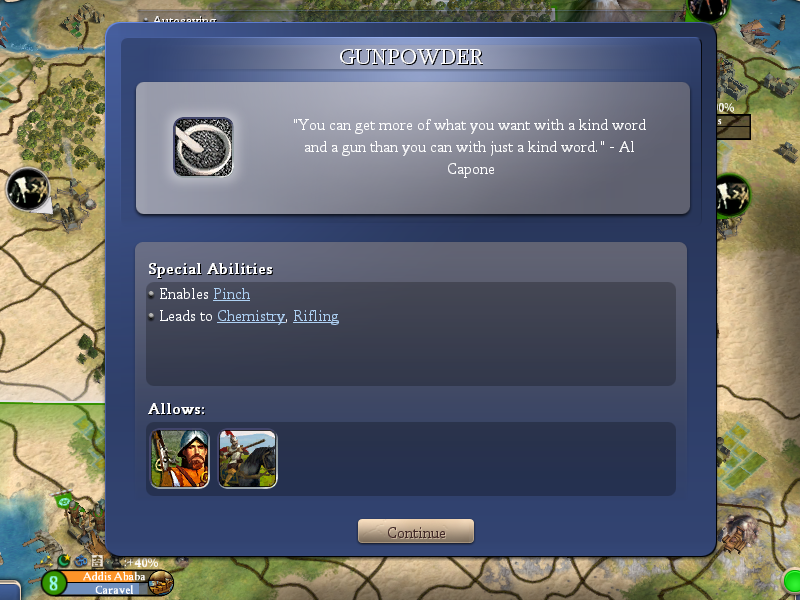
The turn of the fourteenth century saw the first true weaponisation of gunpowder. Previously known for its use in parlour tricks and entertainment, the development of the hand cannon, a simple one-ended pipe with a charge of powder and a lead slug, proved the viability of gunpowder in the production of ranged weapons. Were the original muskeets and arquebusiers employed superior to the longbowmen and archers of the day? Not particularly, especially those regiments that had carried down traditions from centuries of warfare. But muskets were cheap and simple to use and did not require the decades of training for effective use of a longbow. The age of Gunpowder was the age of cheap, massed armies.
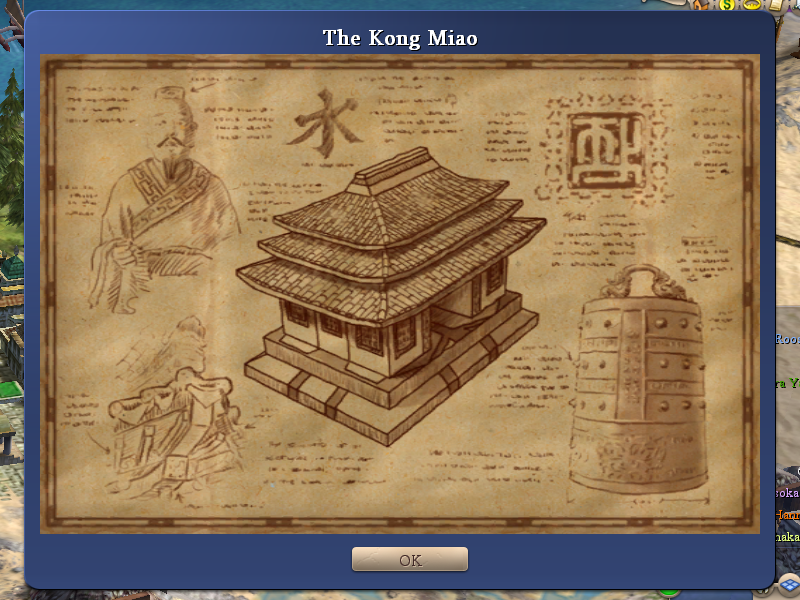
Jeanne d'Arc was born a peasant in the woods of Delhi somewhere between 1327-1329, but her exact date of birth is disputed. In early 1341 she witnessed Notre Dame for the first time in her life and claimed to have been struck by a vision from Victory. She claimed that Victory's chosen people had grown weak and complacent, and that a new time of harsh choices and holy men and women would be upon them. She was a gifted speaker and roused great crowds to her support, fashioning a crude but effective army of fanatics and marching towards London, to take back the Academy from its strayed path as a school and once again dedicate it purely to veneration of Victory.
d'Arc's army was potent and before long she had seized a ship to carry her faithful across to Britain. Upon reaching Camelot she halted the march for three days, to visit the birthplace of Confucius and pay her respects to her prophet. Alas, during her prayer at the ruins of Confucius' own estate she was attacked and assassinated by thugs. Many blamed the Papacy for the act, some holding the belief that it was Victory's punishment for Jeanne's hubris. Notably, those who spoke openly about a belief that their own government might have ordered Jeanne's death mysteriously disappeared, limiting the spread of such rumours. The army, without their leader, broke apart and either returned home or took up residence in Camelot. Jeanne's faithful restored Confucius' estates, the Kong Miao, and made of it a place of pilgrimage for all Confucians.
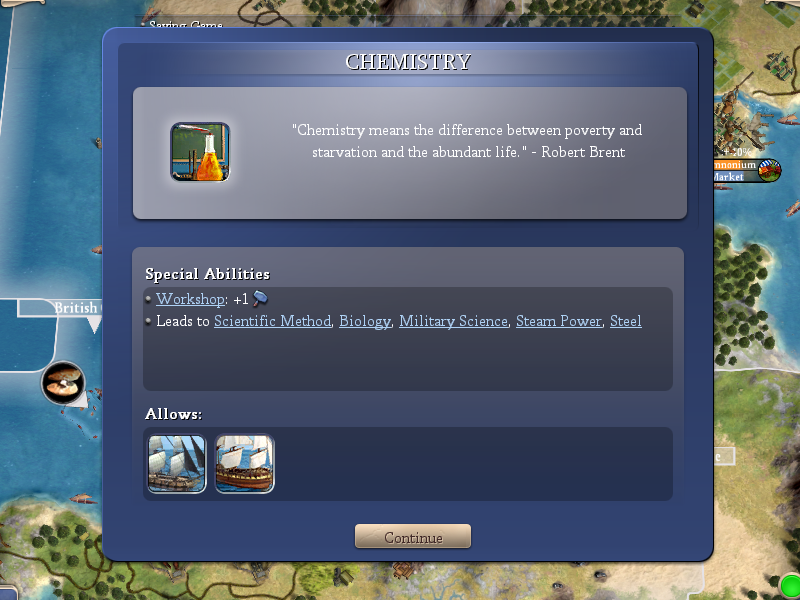
By the 1350s, the growing interest in alchemy brought about by the advent of weaponised gunpowder began to take a more formalised approach, especially in the specialised colleges of the University. The science of chemistry looked at the interactions between and properties of different materials, making great strides in metallurgy and material sciences in the process. Better understanding of industrial processes aided craftsmen across the nation. Improved metalworking techniques and refinement of gunpowder saw the casting of naval cannons, too large and unwieldy to be used successfully on land but a key advancement at sea.
[We have hit 1350, which means that time starts to slow down. We are taking 2 years per turn instead of 5. Chemistry unlocks frigates for us, our first coastal bombarder, but even more importantly it unlocks privateers. Shiver me timbers, lass, because we're entering the true Age of Sail.]

 Author
Topic: Civ IV - Let's Try the British Empire: The Industrial Revolution (Read 17063 times)
Author
Topic: Civ IV - Let's Try the British Empire: The Industrial Revolution (Read 17063 times)
